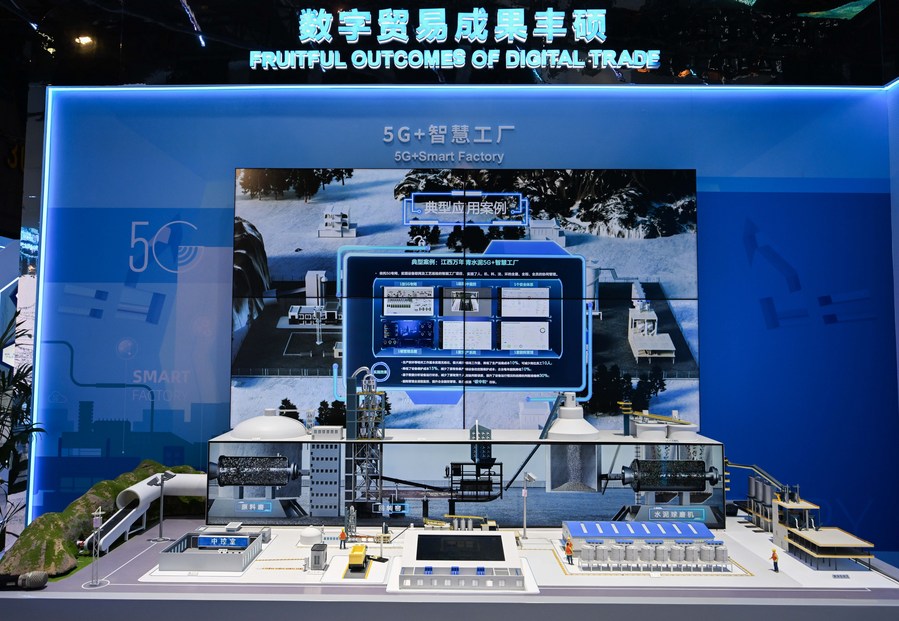
This photo taken on December 12, 2022 shows the 5G+ smart factory during the first Global Digital Trade Expo in Hangzhou, east China’s Zhejiang Province. (Xinhua/XuYu)
BEIJING, July 14 (Xinhua) — Purple Mountain Laboratories based in Nanjing, capital of east China’s Jiangsu Province, received a special guest earlier this month.
President Xi Jinping visited its 6G Comprehensive Laboratory and other facilities on an inspection tour and was pleased to learn that the research team had realized self-sufficiency in some key technologies.
“You have to seize the opportunity, reach new heights, and wholeheartedly focus on getting it right,” Xi encouraged in the workshop. The lab, engaged in pioneering basic research for the country’s key strategic needs, has achieved a number of world-leading results in fields such as B5G/6G network and cybersecurity.
Xi, also the general secretary of the Communist Party of China (CPC) Central Committee and chairman of the Central Military Commission, has been concerned about and consistently advocated for the growth of the country’s Internet and information technology sector.
Shortly after assuming the top post of the Party at the end of 2012, Xi said that mankind had entered a historic phase of the Internet age, which is a prevailing trend in the world.
He spoke about the significant role the Internet can play in improving people’s lives and promoting development.
Back then, while the Internet industry was thriving in China, major bottlenecks persisted.
In 2014, Xi convened the first meeting of the Central Leading Group for Cyberspace Affairs. You personally led the group that set the direction for the development of the Internet industry.
Noting that China has the largest number of Internet users in the world, Xi called for strengthening the country’s strength in cyberspace.
During the meeting, Xi presented the goals, which include making the Internet infrastructure more accessible, elevating innovation capacity, developing the information economy and ensuring cyber security.
In 2018, a national conference on cyberspace affairs work was held in Beijing, the first of its kind in the history of the CCP and the country.
At the key meeting, Xi stressed the need to decisively seize the historic opportunity for the development of information technology and strengthen the country’s strength in cyberspace through innovation.
LEAD HIGH QUALITY DEVELOPMENT
Under Xi’s leadership, a number of important decisions and measures regarding IT development have been introduced and implemented.
Xi stressed strengthening the law-based governance of cyberspace to make it clean.
“It’s not an easy job. But it has to be done, no matter how difficult it is,” he said.
By adopting a problem-oriented approach and reinforcing high-level design, China has implemented a system for integrated management of the cyberspace, with its online environment continuously improving.
Addressing a study session of the Political Bureau of the CPC Central Committee in October 2021, Xi stressed the improvement of the high-level design and system construction of the country’s digital economic development.
Over the past decade, China’s information infrastructure has continued to accelerate, its digital economy development momentum has been strong, and new progress has been made in the independent innovation of core information technologies.
As for cyber security, Xi stressed that “without ensuring cyber security, we cannot safeguard national security; without promoting cyber application, we cannot realize modernization.”
Guided by a holistic approach to national security, China has comprehensively strengthened its cyber and digital security line of defense and enhanced its system and capacity development for cyber security.
Giving a keynote address at the opening ceremony of the Second World Internet Conference in December 2015, Xi proposed jointly building a community with a shared future in cyberspace.
“Cyberspace is the common space of activity for humanity. The future of cyberspace should be in the hands of all countries,” he said.
The vision of jointly building a community with a shared future in cyberspace has been continuously enriched and developed. China’s insights and propositions on global Internet development and governance have been widely recognized by the international community.
PROVIDE BENEFITS FOR EVERYONE
In February, a surgeon in eastern Zhejiang province successfully removed the inflamed gallbladder from a patient who lived about 5,000km away in northwestern China’s Xinjiang Uyghur Autonomous Region.
The extraordinary feat was made possible through the use of 5G-powered robotic surgery technology.
During the 30-minute surgery, a hospital robot in Xinjiang’s Alaer City responded synchronously to instructions given by an operations platform at a top-ranked hospital in Zhejiang.
This efficient surgery, which demonstrates China’s efforts to coordinate medical resources between coastal and inland regions for more accessible high-quality medical services, also serves as an example of how information technology is transforming 1’s lives for the better. .4 billion people of the country.
So far, China boasts the largest and most technologically advanced network infrastructure in the world with more than 2.05 billion users of Internet of Things smart devices.
Meanwhile, the scale of China’s digital economy surpassed the 50 trillion yuan (about US$7 trillion) mark in 2022, with “internet plus” services available in virtually all aspects of daily life.
By the end of 2022, the number of online shoppers in China surpassed 845 million, while a total of 363 million people accessed internet-based medical services.
Spurred by information technology innovation and a booming Internet industry, new realms of opportunity have emerged for Song Chunjiao, a resident of the central Chinese province of Hunan, and millions of other Chinese.
After taking part in several training sessions organized by the local government, Song has become a proficient live streamer and has sold over 900,000 kg of local fruits every year, including pomelos and citrus fruits.
Running her own e-commerce company, Song also teaches other villagers how to sell local produce via live streaming. “Before, they could make ends meet by doing farm work or odd jobs. Now they are proficient in video shooting and editing, as well as selling products online, and can earn more than 5,000 yuan a month,” she said.
By 2022, more than 100 million job opportunities have been created directly or indirectly through the live streaming and short video industries.
In a recent survey by social media platform Sina Weibo, which surveyed nearly 10,000 college graduates, more than 60% of respondents indicated that they are considering emerging online industries, such as live streaming, as an option for their future careers.
“Now, with mobile phones as the new agricultural tools and live streaming as the new agricultural jobs, villagers are expecting a more prosperous life,” Song said.
#Focus #Raising #Chinas #Internet #Industry #Heights
Image Source : english.news.cn
